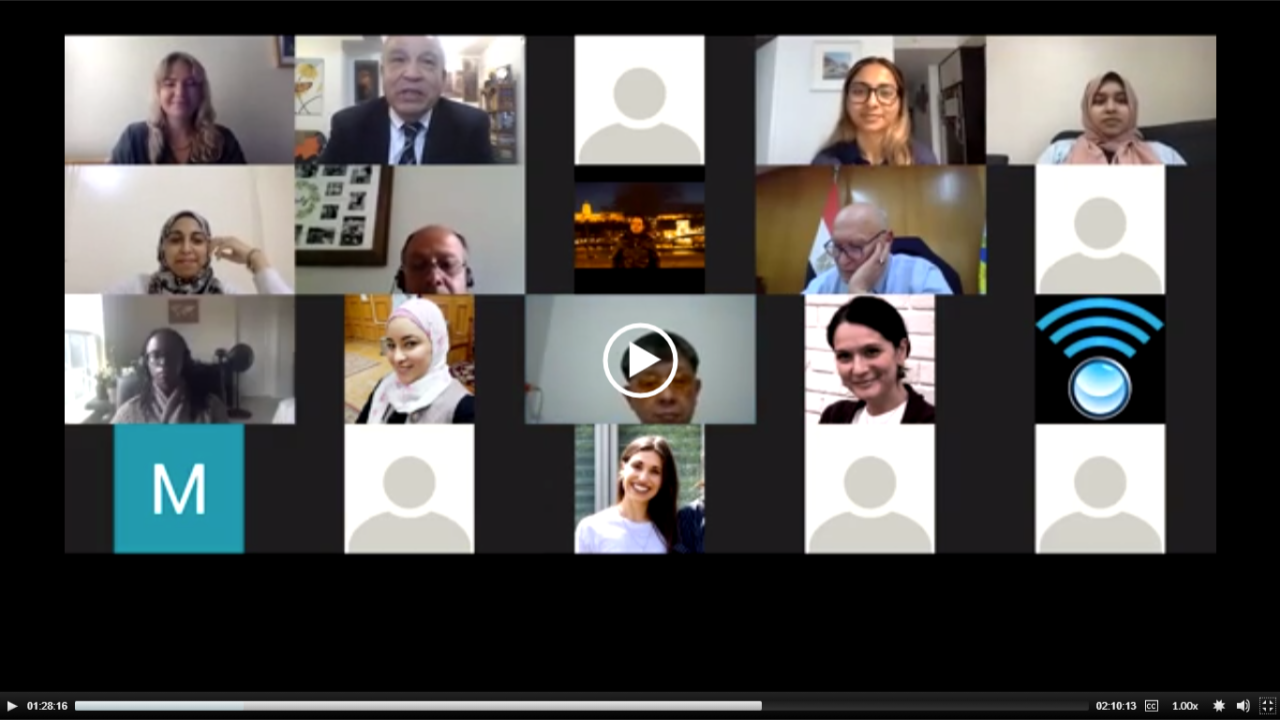
Students, faculty and guests gathered virtually for the UMD Global Classrooms course “MIEH607: Risk Based Approach to Ensure Global Food Safety and Security” during the summer of 2021.
Completing a highly collaborative, research-based project in six weeks when your classmates live in a time zone six hours away is no small feat. This is the challenge that University of Maryland students navigated when they joined peers from Cairo University in signing up for UMD’s graduate-level Global Classrooms course, “MIEH607: Risk Based Approach to Ensure Global Food Safety and Security.”
Overcoming these challenges, as well as language barriers and cultural differences, students in both countries emerged from the course thrilled to have experienced such a unique learning opportunity.
“The best parts were the cultural exchange,” shared Eman Elmaghraby, an Egyptian student in the course who also serves as a lecturer in the Department of Food Hygiene and Control, and faculty of Veterinary Medicine at Cairo University. “We all definitely learned from the diversity of this kind of collaboration, ... the way of thinking of each [team member] was inspiring.”
Sharing diverse perspectives helped deepen the students' exploration of the global health implications of food safety and risk assessment. Today, the U.S. imports much of its food supply, so food safety in the U.S. depends on the effectiveness of food safety systems in other countries. Egypt serves as a critical hub for imports and exports for food and agricultural items among the U.S., North Africa and the Middle East. The country must ensure that those items are safe for handling and consumption as a critical component of global health.
Noting an absence of comprehensive global standards for safe levels of various residues allowed in food (including chemicals, pesticides, drugs, heavy metals, and mycotoxins), the students teamed up with their international peers to conduct in-depth research and develop a database that specifies and records the maximum residue limits (MRLs) for specific foods. The first of its kind, this accessible, user-friendly database has the potential to assist policy makers, businesses, and other organizations in ensuring food safety for the different populations they serve.
A defining feature of this Global Classrooms course is the extent to which it emulates a real global work environment, helping students to cultivate professional skills that will be crucial for future success. Sylvia Costa, an MPH student in the Environmental Health Sciences program at UMD, said:
“I think this really prepares you for the work setting, especially in public health. You will have calls with people who are in different time zones, and you might have colleagues who are in different countries … who have a culture that's very different from you. You might be working with the World Health Organization and you might be working with an Italian government and you have to have that cultural competency to be able to work in that kind of environment. I think that this class offers that cultural competency, or at least gives you the idea that there are things that you can see from different perspectives.”
This course was co-taught by Muhiuddin Haider, Ph.D., a clinical professor in global health in the UMD School of Public Health’s Institute for Applied Environmental Health (MIAEH) and Dr. Abdel-Razak M. Kadry, adjunct faculty with MIAEH. They also brought in leading international food safety experts to engage with students on a variety of topics.
Global Classrooms allow students to gain international experience, virtually, from wherever they are. These programs, developed in partnership with UMD’s Office of International Affairs (OIA), are intentionally designed to facilitate meaningful connection and collaboration with global experts and partners, going beyond the typical online class experience as they help students grow cross-cultural competencies.
“One of the beauties of Global Classrooms is the emphasis on project-based learning,” shared Haider. “Interactive engagement brought by project-based learning is the key to creating a generation of interdisciplinary problem solvers.”
The Global Classrooms program originated in 2013 with an emphasis on small, project-based virtual courses taught in partnership with a university abroad. In these original offerings, now called Global Classrooms Signature courses, students at each university collaborate throughout the semester on meaningful projects, many of which address elements of the United Nations’ Sustainable Development Goals. During 2020, OIA worked to adapt the model for increased flexibility and easier integration into larger, lower-level undergraduate courses. These versatile options are distinguished as Global Classrooms Connections courses.
Global Classrooms Connections courses can include guest lectures, virtual tours, dialogues, and mini-projects with partners overseas. Signature courses, such as MIEH607, facilitate project-based collaboration with peers at an international institution as students work to address global challenges.
Explore current and upcoming Global Classrooms courses: go.umd.edu/gc-umd.
